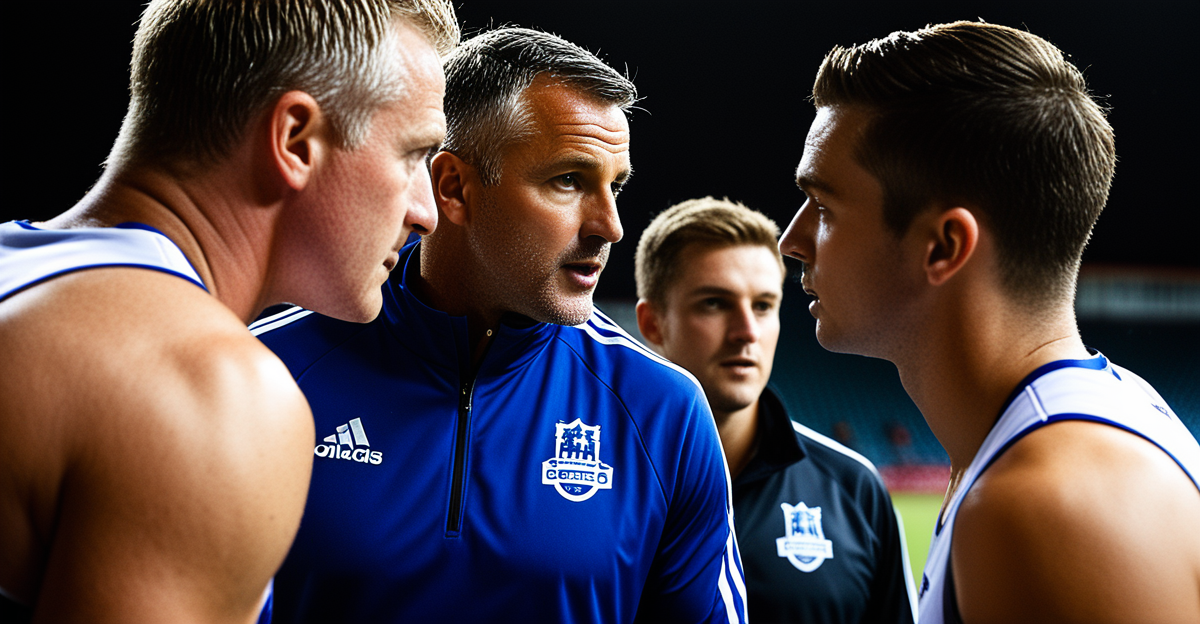The Role of Coaches in Enhancing Team Performance
In the realm of UK sports, coaches play a pivotal role in shaping team success. The core responsibilities of coaches extend beyond mere tactical oversight. They are integral to the team dynamics by fostering an environment where trust and communication are paramount. Trust is foundational, as it allows players to express vulnerabilities without fear, promoting a cohesive team spirit. Effective communication, meanwhile, ensures that each team member understands their role, and aligns with the collective goals, leading to heightened performance levels.
A coach’s leadership style significantly influences a team’s morale and success. Whether adopting an authoritarian, democratic, or laissez-faire approach, the style should resonate with the team’s culture and objectives. Authoritarian coaches may enforce discipline and structure, while a democratic style encourages player input, fostering a sense of ownership. Laissez-faire leadership, where players have more freedom, can boost creativity but requires mature, self-directed athletes. Thus, the best leadership style is often a tailored blend, considering factors like team maturity and individual personalities.
In the same genre : How do UK sports broadcasters enhance viewer experiences?
Ultimately, the combination of trust-building, effective communication, and a fitting leadership style positions coaches in UK sports as catalysts for enhanced performance. Their ability to adapt and cater to the specific needs of their team defines their success and, by extension, that of their team.
Coaching Strategies and Methodologies
Exploring the numerous coaching techniques can shed light on strategies that significantly influence team performance. Coaches in UK sports utilize a variety of approaches to enhance team dynamics, focusing on specialized areas such as tactics, skill development, and mental conditioning.
Also to discover : How Can UK Sports Leagues Advance with Technological Innovations?
Tactical Approaches
Each game plan demands strategic tailoring to resonate with the specific strengths and weaknesses of a team. Coaching techniques often involve in-depth analysis of opponents, leading to the creation of bespoke strategies that maximize team potential during competitions. These tactical approaches ensure teams are not only prepared for the physical challenges of a match but also mentally aligned with the strategic objectives set by their coach.
Skill Development
A cornerstone of successful coaching lies in individualized skill training regimens. Coaches meticulously assess each player’s unique abilities to design tailored development programs aimed at refining specific competencies. This personalized attention allows athletes to overcome personal challenges and leverage their strengths more effectively, ultimately contributing to team success.
Mental Conditioning
An often-overlooked aspect of coaching is mental resilience. Coaches incorporate various mental resilience techniques to foster a mindset capable of withstanding the pressures of competitive sports. Techniques such as visualization, mindfulness, and stress management are integrated into regular training schedules to build robust mental fortitude within athletes, equipping them to handle both the highs and lows of their sporting journeys.
Case Studies of Successful Coaching Practices
The landscape of successful coaching in UK sports offers valuable lessons gleaned from high-performing teams and their leaders. By examining these cases, we can uncover methodologies that have spurred victories and legendary performances.
1. Football’s Impactful Leadership
One standout example is from Premier League football. A coach renowned for transforming underperforming squads relied heavily on fostering player autonomy while maintaining strategic oversight. This approach not only enhanced on-field adaptability but also empowered players, thus boosting overall team morale and performance.
2. Rugby Union: Embracing Team Culture
In rugby, successful coaching has often hinged on a deep understanding of team culture. Coaches in UK rugby have crafted environments where mutual respect and common goals take precedence. This cohesive approach ensures that everyone buys into the shared vision, leading to sustained success.
3. Basketball: Tactical Flexibility
British basketball teams have benefitted from coaches emphasizing tactical flexibility. By continuously adapting strategies to different opponents, these coaches have encouraged players to think critically and react dynamically during games, demonstrating that adaptive planning is crucial for facing diverse challenges.
These illustrative examples highlight how blending effective planning, culture cultivation, and adaptive strategies can profoundly influence a team’s success. Aspiring coaches can use these insights to develop their own pathways to excellence.
Statistical Data on Performance Improvements
In the world of sports, evaluating performance metrics is critical for assessing the effectiveness of coaching interventions. Teams often see substantial shifts in performance thanks to refined coaching methods.
Data-Driven Analysis
Teams leverage data-driven insights to measure improvements pre- and post-coaching interventions. By meticulously tracking key performance indicators (KPIs), such as win-loss ratios, player efficiency ratings, and injury rates, coaches can objectively assess the impact of their strategies.
Correlation Studies
The correlation between coaching styles and statistical outcomes offers enlightening perspectives. For example, teams that adopt a performance-centric coaching approach often report improvements in areas like scoring efficiency and defensive statistics. This data underscores the tangible benefits of aligning coaching methods with team objectives.
KPI Utilization
Successful teams often prioritize KPIs as a fundamental part of their operational blueprint. These KPIs may include metrics like player participation rates, scoring averages, and team cohesion scores. By focusing on these factors, coaches can fine-tune strategies to optimize performance and ensure sustained competitive excellence.
Interviews with Notable Coaches
Insights from sports coaches offer a unique look into the real world of coaching, where experience and adaptability define success. Conversations with seasoned coaches reveal that there’s no one-size-fits-all method. Instead, effective coaching stems from a combination of tried-and-tested techniques and innovative practices tailored to specific team needs. Experienced coaches emphasize the importance of understanding individual players and adjusting strategies to suit dynamic circumstances.
Overcoming Challenges
Notable coaches in UK sports frequently highlight the hurdles encountered during their careers, including maintaining team morale amid losses and navigating player conflicts. Overcoming such challenges requires resilience, empathy, and a keen ability to read situations. One shared sentiment is the significance of mental preparation – ensuring that both coaches and players are psychologically equipped to tackle obstacles head-on.
Advice for Aspiring Coaches
A key piece of advice for aspiring coaches is to remain flexible and open to learning. Staying updated with the latest in sports science and psychological methods is crucial. Successful coaches recommend engaging with professional coaching networks and attending workshops to continuously expand skill sets. Furthermore, developing a deep understanding of team culture and integrating this knowledge into coaching practices is deemed essential for sustained success.
Psychological Aspects of Coaching
In the world of sports coaching, the psychological connection between a coach and their athletes is a cornerstone of success. The psychological aspects involved in coaching can significantly enhance athlete development and team performance.
Coach-Athlete Relationships
The coach-athlete relationship is vital in shaping an athlete’s journey. This dynamic contributes to building trust, enhancing communication, and aligning team goals. A strong relationship fosters an environment where athletes feel supported and understood. Coaches who cultivate these relationships help athletes to remain focused, motivated, and committed, ultimately improving their performance.
Motivational Tactics
Coaches employ various psychological tactics to keep teams motivated. Techniques like goal-setting, positive reinforcement, and self-reflection encourage athletes to push beyond their limits. Motivational speeches and one-on-one interactions tailored to individual needs can inspire athletes, instilling confidence and resilience. Such tactics align the team’s mental state with their physical training, creating a comprehensive approach to success.
Emotional Intelligence
Emotional intelligence is an invaluable trait for coaches, enabling them to manage their own emotions and empathetically understand those of their athletes. This understanding allows coaches to respond effectively in high-pressure situations, ensuring a harmonious team dynamic. Coaches with high emotional intelligence help athletes navigate stress, maintain focus, and build perseverance.
By prioritizing the psychological aspects of coaching, coaches can foster a conducive environment for athlete growth and team triumphs. Understanding these elements aids in creating strategies that not only develop skills but also nurture mental well-being.
Actionable Insights for Aspiring Coaches
Aspiring to join the ranks of prominent coaches in UK sports demands dedication and a proactive approach towards personal development. Essential skills and qualifications are required to ensure a successful career in this dynamic field. Firstly, possessing a deep understanding of both the sport and its coaching techniques is crucial. This includes having expertise in game tactics, skill development, and mental conditioning. Formal education or certifications in sports management can also provide a valuable foundation.
Engaging actively in practical experiences is fundamental. Voluntary coaching roles or mentorship under established coaches offer firsthand insights into successful coaching in UK sports. These experiences help nurture the ability to analyze performance metrics, which is imperative for refining strategies and adapting to dynamic conditions.
Furthermore, continuous learning is pivotal. Aspiring coaches should utilize insights from sports coaches by attending workshops and seminars. These venues provide exposure to cutting-edge methodologies, tapping into a wealth of knowledge from seasoned professionals. Resources such as books, online courses, and webinars focused on coaching techniques enhance one’s tactical repertoire and mental resilience strategies.
Incorporating feedback and self-evaluation practices can refine coaching efforts substantially. Analyzing both successes and failures fortifies one’s teaching approach, offering practical tips on developing coaching strategies suited to varied team dynamics.
In essence, a commitment to ongoing education, combined with practical involvement and reflection, equips aspiring coaches with the necessary skills and insights to carve a successful career in the evolving landscape of UK sports coaching.







